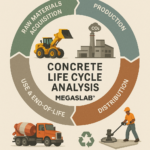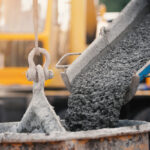When it comes to industrial concrete flooring and pavements, the selection of the right slab system is critical. Developers and engineers face the challenge of balancing cost, performance, and installation efficiency while minimizing long-term maintenance. While several slab options exist—such as trap rock, steel fibers, roller-compacted concrete (RCC), Type K cement, and expansive slabs—each carries its own drawbacks.
Enter MEGASLAB®, a high-performance concrete system engineered to overcome the limitations of these conventional methods. Below, we explore how MEGASLAB® stacks up against these alternatives and why it’s quickly becoming the preferred solution for forward-thinking construction teams.
1. Trap Rock: Durable but Labor-Intensive
Trap rock has long been used for its abrasion resistance and surface durability. However, it comes with notable drawbacks:
- Installation pain: Requires a specialized broadcast process and skilled labor to ensure even distribution and bonding.
- High cost: Trap rock itself is expensive, and the added labor intensifies the overall project cost.
- Surface-only strength: While durable on top, the structural benefits don’t penetrate deep into the slab.
MEGASLAB® Advantage: Provides through-slab performance with advanced nanotechnology-enhanced concrete and eliminates the need for surface hardeners, reducing labor and material costs.
2. Steel Fibers: Strong but Difficult to Work With
Steel fiber-reinforced slabs are used to enhance tensile strength and reduce cracking—but they come with complications:
- Tough finishing: Steel fibers can rise to the surface, causing poor finish quality and safety hazards.
- Pump and placement issues: Fiber dosage can cause clogging during pumping and make placement more difficult.
- Corrosion risk: Over time, exposed fibers can corrode, compromising structural integrity.
MEGASLAB® Advantage: Delivers superior flexural and tensile strength without the complications of steel fiber mixing, placement, or corrosion. Easy to place and finish, with a smooth, consistent surface.
3. Roller-Compacted Concrete (RCC): Fast but Limited
RCC is valued for its quick placement and high compressive strength, but it’s far from ideal for every application:
- Rough finish: RCC lacks the finish quality required for many industrial and commercial floors.
- Limited joint spacing: Still requires frequent joints, which lead to long-term maintenance issues.
- Design constraints: Unsuitable for projects needing precise tolerances or aesthetics.
MEGASLAB® Advantage: Offers ultra-wide joint spacing, often 10x wider than traditional methods, and a high-end finish ideal for warehouses, distribution centers, and retail.
4. Type K Cement: Cracking Control with a Cost
Type K expansive cement is designed to reduce shrinkage cracking, but it introduces complexity:
- Special handling: Requires controlled mixing and placement practices.
- Expensive: The material cost is significantly higher than standard cement.
- Availability: Limited production sources make procurement and logistics difficult.
MEGASLAB® Advantage: Controls shrinkage and cracking without the need for exotic cement blends. Easy to source and install, MEGASLAB® simplifies construction logistics while delivering better performance.
5. Expansive Slabs: Specialized and Risky
Expansive slabs aim to counteract shrinkage using post-tensioning or chemical admixtures, but they come with risks:
- Installation risk: Highly sensitive to placement errors, timing, and curing.
- Engineering complexity: Requires more intensive design coordination and construction oversight.
- Repair challenges: Once issues arise, repairs are often costly and complex.
MEGASLAB® Advantage: Delivers high dimensional stability and crack resistance with a simplified mix design and no need for post-tensioning, reducing both installation risk and long-term maintenance.
Why MEGASLAB® Is the Smarter Solution
MEGASLAB® combines advanced materials science with intelligent slab design to deliver a system that’s not only easier and faster to install, but also:
- Crack-resistant
- Joint-reducing
- Maintenance-minimizing
- Environmentally optimized
- Engineered for longevity
It’s a performance-driven system that removes complexity from the build while enhancing long-term operational value.
Bottom Line
While trap rock, steel fibers, RCC, Type K cement, and expansive slab systems all attempt to solve challenges in concrete performance, they often introduce new ones in terms of cost, complexity, or durability MEGASLAB® is a next-generation slab solution—designed not just to outperform, but to out-simplify. Fewer joints, less cracking, smoother installs, and superior strength make it the clear choice for projects that demand excellence from the ground up.




